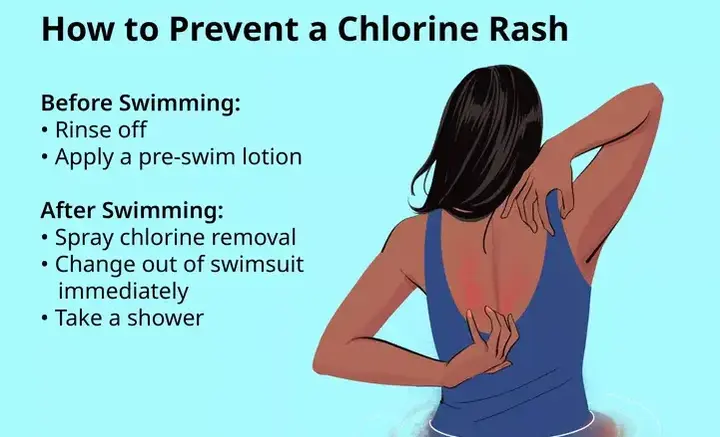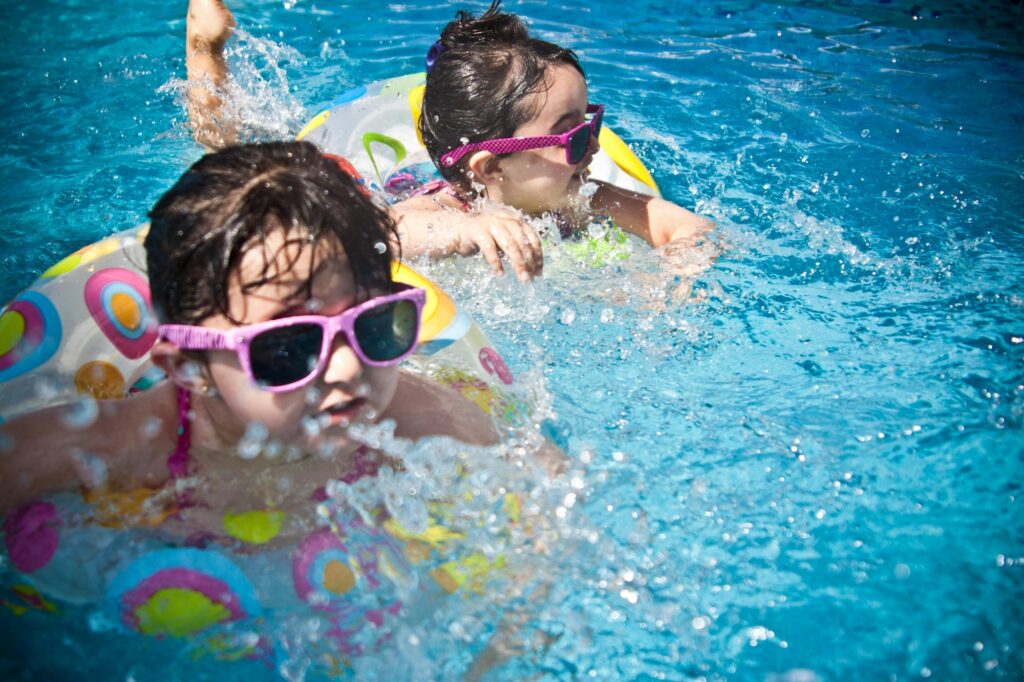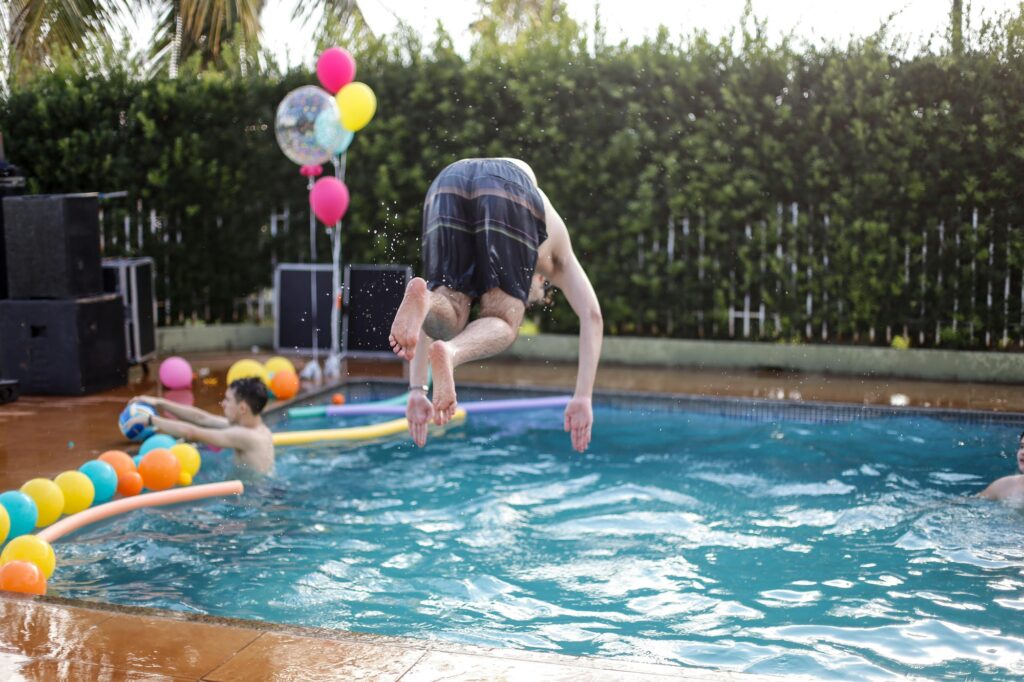Pool Chlorine vs. Mineral Ionization: Which is Healthier for Your Family?

When it comes to keeping your swimming pool clean and safe, choosing the right sanitation method is crucial. Chlorine has been the go-to solution for decades, but concerns about its health effects have led many pool owners to explore alternatives like mineral ionization.
Which one is truly healthier for your family? Let’s explore the benefits and drawbacks of both.
How Do They Work?
Chlorine Sanitization
Chlorine is a chemical that kills bacteria, viruses, and algae by breaking down their cell walls. It comes in various forms, including liquid, granules, and tablets, and needs to be added regularly to maintain proper sanitation.
Pros:
- Highly effective at killing pathogens
- Readily available and widely used
- Works quickly to sanitize water
Cons:
- Can cause skin and eye irritation
- Produces harmful byproducts like chloramines (linked to respiratory issues)
- Requires frequent maintenance to maintain proper chemical balance
Mineral Ionization
Mineral ionization uses natural minerals like copper and silver to purify water. A pool ionization system releases positively charged ions, which disrupt the growth of bacteria and algae.
Pros:
- Gentler on skin and eyes
- No strong chemical smell
- Requires less ongoing maintenance
Cons:
- Slower at killing bacteria than chlorine
- Still requires a backup sanitizer (like a small amount of chlorine or UV filtration)
- Higher initial cost for installation
Side-by-Side Comparison
| Feature | Chlorine | Mineral Ionization |
| Effectiveness | Kills bacteria quickly | Slower but still effective |
| Skin & Eye Irritation | Can cause irritation | Gentle on skin and eyes |
| Maintenance | Requires frequent testing | Less frequent upkeep |
| Odor | Strong chlorine smell | No chemical smell |
| Health Risks | Produces chloramines, which may cause respiratory issues | No harmful chemical byproducts |
| Cost | Lower initial cost, but ongoing expenses | Higher upfront cost, lower long-term costs |
Expert Insights
According to Dr. Lisa Reynolds, a dermatologist specializing in skin sensitivities:
“Many of my patients experience skin dryness and irritation due to prolonged chlorine exposure. Mineral ionization provides a gentler alternative, especially for children and those with eczema or allergies.”
Additionally, the Centers for Disease Control and Prevention (CDC) warns that excessive chlorine exposure can lead to respiratory problems, especially in indoor pools with poor ventilation.

Real-Life Testimonials
Sarah M., a mother of two:
“After years of dealing with red eyes and itchy skin from chlorine, we switched to mineral ionization. It’s been a game-changer—our kids no longer complain after swimming!”
James P., a pool owner:
“I was skeptical at first, but our ionization system has kept our pool clear with much less hassle. We still use a tiny amount of chlorine for extra protection, but overall, maintenance is easier and the water feels much better.”
Are Hybrid Solutions the Best Option?
Some pool owners use a combination of mineral ionization and low-level chlorine for the best of both worlds. This setup significantly reduces chlorine levels while maintaining strong sanitation. Other alternatives include UV filtration and ozone systems, which can also be combined with mineral ionization.
If you’re not ready to completely eliminate chlorine, consider using a lower dose alongside mineral ionization to minimize health risks while keeping your pool crystal clear.
The Environmental Impact: Chlorine vs. Mineral Ionization
When selecting a pool sanitation system, it’s essential to consider not only the health impact but also the environmental footprint. Both chlorine and mineral ionization have their own effects on the environment, and understanding these can help you make a more eco-friendly decision.
Chlorine’s Environmental Impact:
Chemical Byproducts: Chlorine creates harmful byproducts, including chloramines and trihalomethanes (THMs), which are known to contribute to water pollution. These chemicals can be toxic to aquatic life if not disposed of correctly.
Pool Water Disposal: The regular addition of chlorine to the pool can make it more challenging to dispose of pool water safely. Chlorinated water can harm plant life and wildlife if it is not treated before being released into the environment.

Mineral Ionization’s Environmental Impact:
Reduced Chemical Usage: Mineral ionization systems significantly reduce the need for harsh chemicals. This results in less waste and fewer harmful substances being introduced into the environment.
Eco-Friendly Minerals: Copper and silver, the primary minerals used in ionization, are naturally occurring and less harmful to the environment. These minerals do not pose the same level of ecological risk as chlorine-based chemicals.
If environmental sustainability is important to you, mineral ionization offers a clear advantage by reducing chemical use and its associated impact.
Ease of Maintenance: How Do Both Systems Compare?
Proper pool maintenance is a must to ensure that your pool water remains safe and clean for your family. Let’s take a closer look at how both chlorine and mineral ionization systems compare when it comes to maintenance.
Chlorine Pool Maintenance:
Frequent Chemical Testing: Chlorine pools require regular testing of water levels to ensure the proper balance of chlorine and other chemicals. This testing is necessary to maintain effective sanitation and avoid issues like skin irritation or algae growth.
Chlorine Replenishment: You need to constantly replenish chlorine tablets, liquid, or granules to keep your pool properly sanitized. This means that you may need to visit the pool store regularly or keep stock on hand.
Skimming and Cleaning: Like any pool, chlorine pools still need regular skimming to remove debris, and periodic cleaning of the pool walls and filters.
Mineral Ionization Pool Maintenance:
Less Frequent Chemical Testing: With mineral ionization, the water chemistry requires much less frequent testing. Since ionization reduces the need for chlorine, you won’t need to monitor levels as closely.
Lower Chemical Use: While you still need to add a small amount of chlorine or use UV filtration as a backup, mineral ionization reduces the overall amount of chemical maintenance. This makes it easier to maintain the water balance in your pool.
Minimal Maintenance: Ionization systems typically need to be checked periodically to ensure the mineral levels are optimal. Once set up, maintenance is much less labor-intensive.
Ultimately, mineral ionization offers a more hands-off approach with fewer chemicals, reducing the time and effort needed for maintenance.
Long-Term Health Benefits: What’s Best for Your Family?
When considering which pool sanitation method is healthier for your family, it’s important to think about the long-term health implications. While both chlorine and mineral ionization can maintain safe and clean pool water, they each come with distinct effects on health over time.
Chlorine Health Considerations:
Respiratory Effects: Regular exposure to chlorine fumes, especially in indoor pools, can cause respiratory issues, including coughing, wheezing, and asthma-like symptoms. Prolonged exposure may exacerbate pre-existing respiratory conditions.
Skin Dryness and Sensitivity: Chlorine can strip the skin of its natural oils, leading to dryness, itchiness, and even rashes for some people. Those with sensitive skin or conditions like eczema may experience discomfort after swimming in a chlorinated pool.
Eye Irritation: Chlorine causes eye irritation in many swimmers, leading to redness and discomfort. This is especially common when chlorine levels are high or when a pool is poorly maintained.

Mineral Ionization Health Benefits:
Gentler on Skin and Eyes: Mineral ionization systems are much gentler on the skin and eyes compared to chlorine pools. This is especially beneficial for children, people with sensitive skin, or individuals who suffer from skin conditions like eczema or psoriasis.
Lower Chemical Exposure: Since mineral ionization pools use fewer chemicals, there is less risk of overexposure to potentially harmful substances. This makes them a safer option for families concerned about chemical sensitivity.
Improved Water Quality: Mineral ionization can help prevent the buildup of harmful bacteria and algae, leading to cleaner water with fewer chemicals involved. This results in a more natural swimming experience.
For families seeking long-term health benefits, mineral ionization presents a healthier alternative with fewer chemical irritants.
How Much Does It Cost to Switch to Mineral Ionization?
One of the most common concerns for pool owners considering mineral ionization is the cost. While mineral ionization systems do require a higher initial investment, the long-term savings in reduced chemical costs and maintenance may make it a more economical choice in the future.
Initial Cost of Installation:
- Chlorine Pools: Installing a traditional chlorine pool is generally more affordable upfront. Chlorine is inexpensive and readily available, making it a cost-effective choice for many pool owners.
- Mineral Ionization Pools: The initial setup cost for mineral ionization is higher because the system requires specialized equipment, including mineral ionizers, and may involve professional installation.
Ongoing Costs:
- Chlorine Pools: Chlorine pools require ongoing expenses for chlorine tablets, liquid, or granules, as well as other chemicals to maintain proper pH levels and water balance.
- Mineral Ionization Pools: While mineral ionization reduces the need for chlorine, you may still need to purchase a small amount periodically. Additionally, ionization systems require minimal maintenance, lowering long-term upkeep costs.
In the long run, mineral ionization may save you money by reducing chemical expenses and lowering maintenance costs.
The Future of Pool Sanitation: Advances in Technology
As pool sanitation technology evolves, more innovative solutions are emerging that combine the best aspects of both chlorine and mineral ionization. These options provide health-conscious and eco-aware pool owners with better alternatives to maintain clean and safe water. The latest systems aim to offer a more sustainable and efficient way to sanitize pools, while prioritizing family health.
Hybrid and Advanced Sanitation Systems
Hybrid systems that blend chlorine with mineral ionization or other methods like UV or ozone filtration are becoming increasingly popular. These systems significantly reduce chemical usage, minimizing the health risks associated with chlorine exposure. By combining mineral ionization with lower chlorine levels, hybrid systems can maintain high hygiene standards without the harsh chemical smell or side effects.
Additionally, UV and ozone systems are gaining traction, either as complementary methods or standalone solutions. UV systems use ultraviolet light to destroy bacteria, viruses, and algae, while ozone generators target chlorine-resistant organisms. When paired with ionization, these technologies create a powerful, chemical-free sanitation solution. For families concerned about the long-term effects of chemicals, these innovations offer a safer, more natural way to keep pools clean.
The Role of Automation in Pool Maintenance
Automation has revolutionized pool maintenance, making it easier for owners to manage their pools without constant testing or chemical adjustments. New automated monitoring systems track water quality in real-time and adjust sanitizer levels as needed. These systems detect pH levels, chlorine concentration, and water temperature, alerting owners through their phones when any readings fall outside the ideal range.
For a completely hands-off approach, smart pools integrate with home automation systems, ensuring that your pool remains clean and healthy with minimal effort. These technologies provide personalized control over water conditions, reducing unnecessary chemical use and offering peace of mind to busy families.

Environmental and Health-Focused Trends
With growing environmental awareness, more pool owners are choosing eco-friendly sanitation methods. Mineral ionization systems, for example, are known for their low energy consumption and reduced environmental impact. Now, solar-powered ionization systems are available, making it even more sustainable to maintain a pool with minimal carbon footprint.
Additionally, saltwater pools are becoming a popular alternative to traditional chlorine pools. While they still use chlorine to disinfect the water, saltwater pools produce it through an electrolysis process, resulting in lower chlorine concentrations and fewer chemicals overall. For families seeking a natural swimming experience, combining saltwater with mineral ionization offers an environmentally friendly and health-conscious solution.
Making the Best Choice for Your Family
When deciding between chlorine and mineral ionization for your pool, consider your family’s health, your budget, and how much maintenance you’re comfortable with. While chlorine remains the go-to option for many due to its effectiveness and lower initial cost, mineral ionization may be a better long-term choice for families prioritizing skin health, respiratory safety, and an eco-friendly approach.
For those who want the best of both worlds, hybrid solutions combine mineral ionization with a small amount of chlorine, reducing chemical exposure while maintaining a clean and healthy pool.
Whatever method you choose, regular testing and proper pool maintenance are essential to keeping your pool safe and enjoyable for your family. Now that you have a better understanding of your options, you can confidently make the right choice for your family’s health and your pool’s care.


